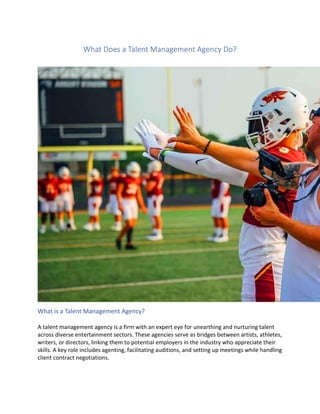Some Of The Casting Connection
Some Of The Casting Connection
Blog Article
The Definitive Guide for The Casting Connection
Table of ContentsThe Casting Connection for BeginnersThe 6-Second Trick For The Casting ConnectionThe Buzz on The Casting ConnectionThe 15-Second Trick For The Casting ConnectionAbout The Casting Connection
A talent scout acts as an agent for artists, performers, professional athletes, and other people in the entertainment sector. Their key obligation is to advertise and represent their clients' passions, helping them safe and secure possibilities such as acting functions, modeling jobs, endorsements, songs contracts, or sporting activities bargains. Talent agents function closely with their clients to understand their occupation goals and ambitions, and after that utilize their sector connections and knowledge to bargain contracts, secure auditions, and explore various avenues for exposure and success.Talent scout usually function in busy and dynamic atmospheres that revolve around the show business. Their offices can vary based on the size and sort of firm they are utilized in. Here are some usual facets of the office of a skill representative: Talent Agencies: A lot of ability agents function in ability firms, which can vary from tiny store agencies to huge, reputable firms.

6 Simple Techniques For The Casting Connection
These meetings can occur in the firm's office, at client events, or at external areas hassle-free for the customer. Auditions and Spreading Calls: Representatives might accompany their customers to auditions and casting telephone calls, providing support and advice throughout the process. This might include traveling to various places, such as production studios, casting workplaces, or movie sets.
These arrangements usually occur via phone or e-mail, with agents working faithfully to safeguard beneficial terms for their clients. Research and Market Updates: Agents stay notified concerning sector patterns, casting phone calls, and market demands. They carry out study on potential clients, jobs, and sector advancements to give valuable understandings to their customers.
They utilize e-mail, telephone call, video conferencing, and specialized software program to stay in touch with customers and industry get in touches with. https://penzu.com/p/50e9c80e00b08571. High Stress and Lengthy Hours: The enjoyment market runs on limited routines and deadlines - Theatre audition scripts and librettos. Skill agents commonly work long hours, consisting of evenings and weekend breaks, to ensure they are readily available to respond to chances and client needs without delay
They should be critical and convincing to protect the ideal offers for their customers, whether it's for a duty in a movie, a modeling contract, or a music offer.
Getting My The Casting Connection To Work
As soon as you know the difference, it comes to be really clear. Numerous individuals new to the acting service, and even more of those outside of it do not understand the difference. In a couple of words: Basically, a talent representative is worked with by the star to stand for the star. The star's agent watches out for ability's interests, dealing with their behalf (the very interpretation of "agent").
They are hired by the producer or the end-client, and their loyalty is to that side of the manufacturing chain. In the service of item marketing and marketing interactions, there are all kinds of representatives.

And yet, although the talent scout is paid by talent (generally via commission), they should also satisfy the producer to do their work efficiently. Casting Representative: Rarely in significant markets, however often in smaller sized markets, some talent scout play both functions, a minimum of functionally. They represent the ability (usually being paid by commission), but they might additionally perform tryouts themselves.
Excitement About The Casting Connection

Marketing Company: This agency represents the "advertiser," which is the firm that creates or markets the product and services being offered. https://pubhtml5.com/homepage/iwcry/. With the growing of media kinds over current years, an ad firm may produce any type of sort of marketing interaction or audio product, ranging from a radio commercial to a viral internet video
These, and agents by various other names are comparable to the ad agency, in that they serve the marketing professional, in different methods. Their solution might be more comprehensive (e.g., an advertising agency might do anything that is marketing-related), or could be a lot more certain (e. Casting notices and deadlines in the US.g., a media company suggests and/or acquires media time and room)
The 7-Minute Rule for The Casting Connection
Skill Precursor. This is not so a lot a title as a technique to searching for and picking brand-new skill. It describes looking for out interesting (and hopefully capable) ability, rather than going out via the traditional casting chain and having picked alternatives return. The scouting process may consist of the complete world of trained, developed skill, but is not always restricted to them.
From a client/producer's viewpoint, scouting for talent is a legit method, however probably not their only technique. It's inherently ineffective and unpredictable; the ability could have some distinct quality, yet be untrained, undirectable and/or unstable, and obviously, the outset of a limited production timetable is not the time to start hunting for rough diamonds.
Report this page